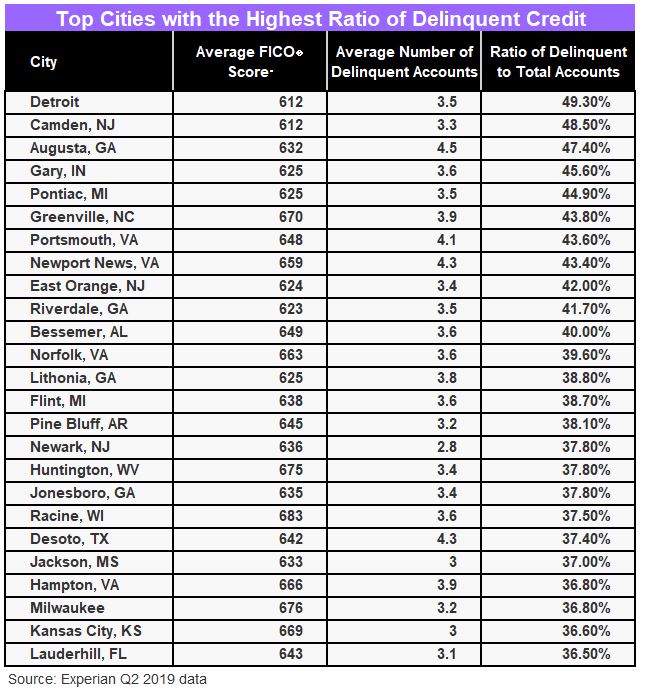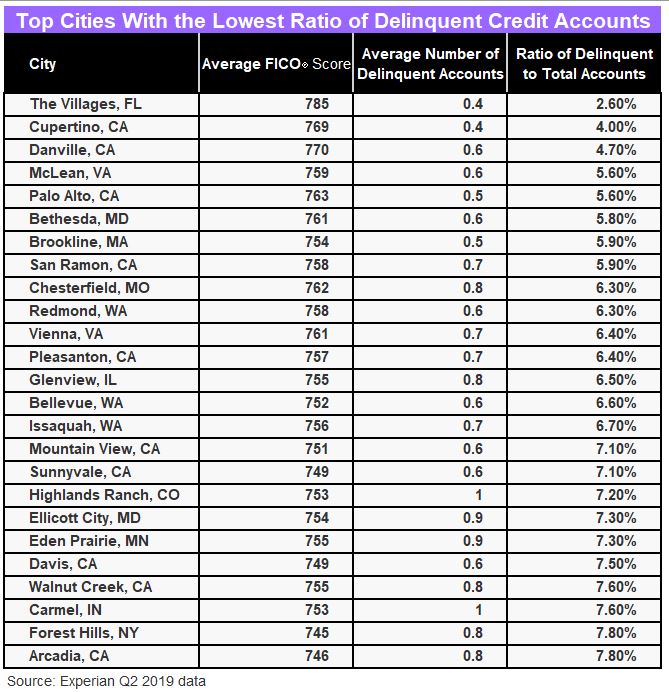
Experian – As credit scores in the U.S. maintain record highs, the number of delinquent credit accounts consumers have is slowly decreasing. Across the country, most cities have seen their ratio of delinquent to total credit accounts go down—in some cases decreasing by as much as 32 percentage points over the past five years.
These drops are significant, and so is the effect they may have had on consumers’ average credit scores—which in most of these cities have increased in the same period of time. In fact, the average credit score in the U.S. has increased 10 points over the past five years to 703.
As part of our ongoing look at credit scores throughout the U.S., Experian analyzed consumer credit data for the second quarter (Q2) of 2019 to see how borrowers in American cities are managing their debt.
For this analysis, we compared the average number of accounts that have ever been 30 days or more past due (delinquent accounts) with the average total number of credit accounts per consumer (total accounts).
Cities With the Highest Ratio of Delinquent Credit Accounts
Borrowers in Detroit are struggling the most with their debt, with an average ratio of 49.3% delinquent to total credit accounts in Q2 2019, according to Experian data. In comparison, the national delinquency ratio across the nation as of Q2 2019 is 17.5%, about one-third of the rate held by consumers in Detroit.
Detroit was followed by Camden, New Jersey; Augusta, Georgia; Gary, Indiana; and Pontiac, Michigan, as the cities with the highest ratios of delinquent credit accounts to total accounts. The 25 cities with the highest delinquency ratios all more than double the national average.

Cities That Have the Lowest Ratio of Delinquent Credit Accounts
Borrowers in The Villages, Florida—a retirement community—had the lowest ratio of delinquent credit accounts in Q2 2019, with only 2.6% of their credit accounts considered delinquent. The Villages is also the city with the highest average FICO® Score in the U.S., which is not surprising, as residents of the community have both more established credit history and immaculate payment history, according to Experian data.
The Villages was followed by Cupertino, California; Danville, California; McLean, Virginia; and Palo Alto, California, as the top five cities with the lowest ratio of late accounts. All 25 cities with the lowest delinquency ratios also maintained an average credit score significantly above the national average.

Cities That Saw Biggest Improvement in Delinquent Credit Account Ratio
Camden, New Jersey, saw the nation’s largest improvement in the ratio of delinquent to total credit accounts over the past five years, according to Experian data. Camden borrowers reduced their ratio of late payments by over 32 percentage points, dropping from a ratio of 80.6% in Q2 2014 to their current 48.5% for Q2 2019.
Camden’s delinquency ratio is still the second-highest in the country, but the progress shown over the past five years is promising.

Nearly Every City Surveyed Saw Delinquent Credit Account Ratios Drop and Credit Scores Increase
Of the nearly 1,000 cities we looked at for our analysis, almost all of them saw a decrease in their delinquency ratio and an increase in their average credit score, according to this analysis.
We looked at 976 cities in this analysis, and just 24 saw their ratio of delinquent credit accounts rise between Q2 2014 and Q2 2019. The remaining 952 saw at least some decrease in their delinquency ratio.
When it came to credit scores, almost all cities also had their average credit scores go up over between 2014 and 2019. Only 15 cities saw their scores decrease, with scores in the remaining 961 cities either increasing or staying the same.
What Does Decreased Delinquency Mean for City Credit Scores?
It’s impossible to say for sure that the drop in the delinquency ratio in these cities is what caused their average credit scores to go up. Credit scores are based on many factors, and scores have been generally risen across the country in recent years. But the fact remains that the majority of cities that saw above-average growth in credit scores also saw a bigger decline in their delinquency ratio. Because payment history is the most important factor in credit score calculations, it’s safe to assume on-time payments may have helped consumers’ credit scores improve.
For perspective, the average FICO® Score in the U.S. has only increased 10 points over the past five years. And in exactly half—488—of the 976 cities in this analysis, credit scores increased 10 points or more—with many increasing by as much as 15 or 20 points.
Methodology: The analysis results provided are based on an Experian-created statistically relevant aggregate sampling of our consumer credit database that may include use of the FICO® Score 8 version. Different sampling parameters may generate different findings compared with other similar analysis. Analyzed credit data did not contain personal identification information. Metro areas group counties and cities into specific geographic areas for population censuses and compilations of related statistical data.
FICO® is a registered trademark of Fair Isaac Corporation in the U.S. and other countries.
Want to instantly increase your credit score? Experian Boost™ helps by giving you credit for the utility and mobile phone bills you’re already paying. Until now, those payments did not positively impact your score.
This service is completely free and can boost your credit scores fast by using your own positive payment history. It can also help those with poor or limited credit situations. Other services such as credit repair may cost you up to thousands and only help remove inaccuracies from your credit report.
October 21, 2019










